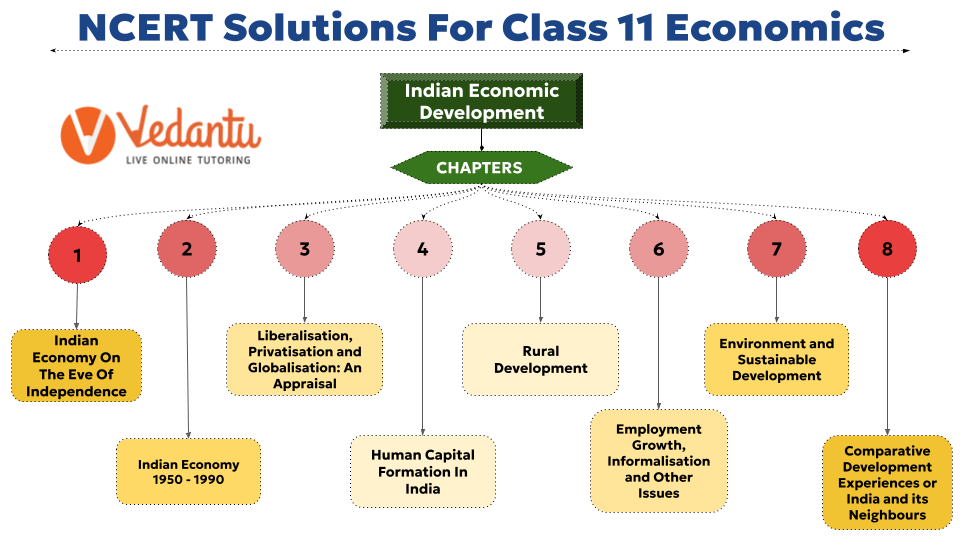Chapter-wise Class 11 Economics Questions and Answers Free PDF Download
NCERT Solutions for Class 11 Economics
FAQs on NCERT Solutions For Class 11 Economics All Chapters - 2025-26
1. What is the step-wise approach to solving NCERT questions in Class 11 Economics Indian Economic Development?
To solve NCERT questions in Class 11 Economics, begin by reading the question carefully to identify key terms. Next, break the problem into smaller parts and write definitions or explanations as required. Use diagrams or charts for concepts like demand and supply, and provide calculations where necessary. Finish by reviewing your answer for accuracy and clarity, ensuring each step follows the CBSE pattern for marking.
2. How do NCERT Solutions for Indian Economic Development help students understand complex economic reforms?
NCERT Solutions offer step-by-step explanations, clear diagrams, and real-life examples that make concepts such as liberalisation, privatisation, and globalisation more accessible. This structure aids students in breaking down complex reforms into understandable segments, enhancing both retention and application in exams.
3. Why is the use of diagrams recommended for answers in Class 11 Economics NCERT Solutions?
Diagrams effectively illustrate economic phenomena like demand and supply curves, market equilibrium, and resource allocation. In NCERT Solutions, incorporating diagrams helps students visualise concepts, enhances clarity, and boosts marks by aligning with CBSE’s recommended answer presentation style.
4. What are the most common mistakes students should avoid when using NCERT Solutions for Class 11 Economics?
The most common mistakes include skipping essential steps, incomplete explanations, neglecting diagrams, and misinterpreting terms like marginal utility or economic reforms. Students should follow each solution carefully, reference key terms, and check for mistakes in calculation or reasoning.
5. How can students ensure their answers in Indian Economic Development are CBSE marking scheme compliant?
Students should use step-wise formatting, include relevant definitions and diagrams, support answers with examples, and use precise economic terms from the NCERT syllabus. Adhering to logical sequencing and labelled diagrams maximises scoring as per CBSE’s marking scheme.
6. In what ways do the NCERT Solutions foster conceptual clarity for Indian Economic Development topics?
NCERT Solutions provide concise definitions, break complex processes into actionable steps, and illustrate real-world applications. This approach fosters a deeper understanding of economic development, policy reforms, and socio-economic issues, helping students relate theory to current events.
7. How do step-wise NCERT Solutions aid in answering HOTS (Higher Order Thinking Skill) questions?
Step-wise solutions guide students through logical analysis, enabling them to systematically approach HOTS or application-based questions. By providing problem-solving frameworks and real-life examples, these solutions improve critical thinking and exam performance.
8. What is the best method for practising numerical and diagram-based questions using NCERT Solutions?
The optimal method involves first understanding the concept behind the question, following each step outlined in the NCERT Solution, drawing neat and labelled diagrams, and checking answers against the CBSE format. Regular practice using this method strengthens problem-solving and visual representation skills.
9. How can students use NCERT Solutions to revise core topics before exams in Indian Economic Development?
Students can quickly review solved examples for core topics, summarise key points provided in each solution, and attempt unsolved exercises using the same step-wise method. Revisiting diagrams and conceptual explanations in NCERT Solutions is especially helpful for thorough last-minute revision.
10. What makes the NCERT Solutions for Class 11 Indian Economic Development more reliable compared to other reference materials?
These solutions are created strictly according to the CBSE 2025-26 syllabus and emphasise step-wise methods, accurate terminology, and clear formatting. Their alignment with official guidelines ensures they address exactly what examiners look for, making them more reliable for scoring well.
11. How does practicing with NCERT Solutions improve time management during Class 11 Economics exams?
NCERT Solutions encourage a structured answer format with clear, concise points and effective use of diagrams. Regular practice helps students judge how much time to spend on different question types, ensuring they complete all sections within the allotted time.
12. Can NCERT Solutions help address misconceptions in topics like sustainable development or human capital formation?
Yes, NCERT Solutions clarify common misconceptions by offering precise definitions and real-world examples for topics like sustainable development and human capital formation. This improves conceptual accuracy and prevents misunderstandings in exam answers.
13. What role do step-wise NCERT Solutions play in mastering application-based questions in Economics?
Step-wise solutions teach students how to connect theory with practical situations, ensuring they answer application-based questions logically. This systematic approach helps link multiple concepts within a single answer, which is essential for scoring high in Class 11 Economics exams.

























